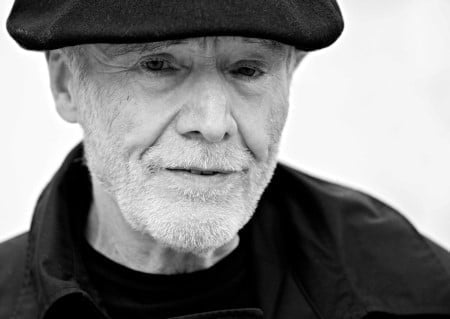
Ryszard Krynicki
- Poland
- Zu Gast beim ilb: 2003, 2017
Ryszard Krynicki was born in Sankt Valentin (Wimberg Camp), Lower Austria, in 1943, where his Polish parents had been deported to a forced labor camp. After graduating in Polish studies from Adam Mickiewicz University in Poznan, he worked as a librarian and editor of the magazine »Student«, which he had to give up due to his involvement in the civil rights movement. Krynicki was a leading member of the renowned Nowa Fala (»New Wave«) group of poets, a collective formed in the late 1960s to oppose the ideology and language of the prevailing political system. On the late 1970s, his involvement with Nowa Fala led to his being banned from publishing any work for several years. The poet has translated the work of many German authors into Polish, including Nelly Sachs, Paul Celan, Bertolt Brecht and Reiner Kunze, and has received many prizes, including the Friedrich Gundolf Prize in 2000 for promoting German culture abroad.
Over the years, Ryszard Krynicki’s poems underwent a striking transformation. Written just after his debut in 1966, his early poems are shaped by dense metaphors and opulent imagery, through which the world is portrayed as a terror-invoking maelstrom. Uncertainty and fear characterize the figures in this universe, who try to escape as a way out. Both in terms of content and language, Krynicki is able to write in a way that renounces the ideological model of society and its prescribed use of language. This critique does not lead to nihilistic despair, but instead keeps »the conscience alert, which is constantly endangered by outer constraints and the possibility of inner stultification, thereby hoping to heal the disturbed, sickened sense of self-esteem« (Karl Dedecius). More recent works, such as »Wunde der Wahrheit« (1991; tr, Wound of truth) are more minimal and laconic. Just a few lines long, the clarity of language is almost ascetic in comparison to the first poems. Krynicki proves himself to be a relentless critic of reality, a skeptical observer of language and its poetical and political potential. »Escape«, writes one critic, commenting on the change in Krynicki’s tone, »is replaced by an unflinching, spiritual pilgrimage.« Krynicki even thoroughly reworks his older poems, minimizing the previously lavish language – demonstrating that there is considerable truth in the sentiment that a poem is never finished. Published in 2017, »Sehen wir uns noch?« (tr. Will we still see each other?), encompasses a broad selection of his work, ranging from his politically oppositional early poems to the sparse verse of his later years, in which Krynicki is able to condense all the beauty and impermanence in the world.
Krynicki lives in Krakow where, together with his wife, he runs the publishing house a5. He is a member of the Saxon Academy of Arts and the Polish Academy of Arts and Sciences.
Wydawnictwo Poznańskie
Poznań, 1969
Nasze życie rośnie
Instytut Literacki
Paris, 1978
Niepodlegli nicości
Niezależna Oficyna Wydawnicza
Warschau, 1988
Um niemanden zu verletzen
Tiessen
Neu-Isenburg, 1991
[Ü: Karl Dedecius]
Wunde der Wahrheit
Suhrkamp
Frankfurt a. M., 1991
[Ü: Karl Dedecius]
Magnetyczny punkt
CiS
Warschau, 1996
Stein aus der Neuen Welt
Rospo
Hamburg, 2000
[Ü: Esther Kinsky]
Kamień, szron
Wydawnictwo a5
Krakau, 2004
Przekreślony początek
Buiro Literackie
Kołobrzeg, 2013
Sehen wir uns noch?
Hanser
München, 2017
[Ü: Renate Schmidgall, Esther Kinsky u. Karl Dedecius]
